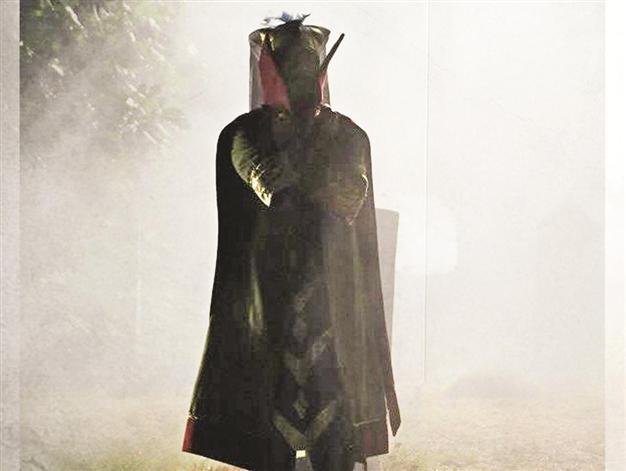Attack of the vampires in Turkey’s popular culture
EMRAH GÜLER ANKARA - Hürriyet Daily News

Vampires in Turkish pop culture may have stayed silent for too long, but they seem to be rising from the dead in the last couple of years. A new movie released is a good exemple of a Turkish vampire movie. ‘Laz Vampir: Tirakula,’ is a jumble of historical occurrences.
The last decade has seen vampires rise once again from their coffins. With the final movie in the epic teen vampire saga “Twilight” hitting theaters recently, along with cult-favorite TV shows like “The Vampire Diaries” and “True Blood,” there are plenty of examples around us. Vampires, in fact, have always been on the loose throughout the last century in Western culture, going back into their coffins occasionally only to wake up even hungrier.
With the vampire craze not losing any steam for decades, it’s quite surprising to see that the existence of original vampires in Turkish pop culture is next to none. Especially when you go back to the origins of vampires in Western fiction. The horror novel that opened the way to a plethora of fascinating blood-sucking characters in the decades to come was Irish writer Bram Stoker’s “Dracula.”
The inspiration behind the 1897 Gothic novel was Vlad III, the prince of Wallachia in Eastern Europe in the 15th century. Known posthumously as Vlad the Impaler, the ruler was known for his brand of cruelty across Europe, which included impaling his enemies. Vlad’s ultimate enemy was the Ottomans, hence depictions of his endless cruelty made history books, securing his reputation as one of the biggest villains in Turkey’s collective consciousness.
One would expect a whole list of inspired vampire stories from Turkish writers, filmmakers and cartoonists. Bizarrely, there are less than a dozen with hardly any that could be called inspired. The most recent example is this week’s release “Laz Vampir: Tirakula,” taking history as its cue but foraying into cheap laughs with outdated clichés.
While the origin story of “Laz Vampir: Tirakula,” directed by Metin Koç and Ulaş Zeybek, is a jumble of historical occurrences, history has no relevance on the movie, which takes place today. As the story goes, Count Dracula is blood brothers with Sultan Mehmed II (the name thrown out for a bit of fancy historical reference), and his eternal enemy is the Ottoman vampire hunter Koçoğlu. The two resurrect in today’s Turkey. And to outsmart his archenemy, Dracula bodysnatches an unsuspecting cab driver. The rest is send-ups and plays on cliché, with nothing new to bring on spoofs or on vampire fiction.
Dracula travels to IstanbulIt’s not the first time Dracula has traveled to Turkey. In the heyday of Turkish cinema’s fascination with Hollywood in the 1950s to 1970s, many American heroes crept onto Turkish screens. Superman, Batman, Tarzan, Phantom and Mandrake the Magician all found themselves in Turkish adaptations, some reaching global cult status.
Director Mehmet Muhtar’s “Drakula Istanbul’da” (Dracula in Istanbul) of 1953 is an adaptation of Ali Rıza Seyfi’s 1928 novel “Kazıklı Voyvoda” (Vlad the Impaler), which in turn is an adaptation of Bram Stoker’s “Dracula.”
All of the characters of the original novel stay intact, with the necessary changes made to adapt it to modern Turkey. The journey from Transylvania from London changes its route to Istanbul. Jonathan Harker becomes a Turkish lawyer, Azmi; his girlfriend Mina Harker becomes a cabaret dancer to make the film juicier, and the vampire hunter Abraham Van Helsing turns into Doktor Resuhi.
The film, starring the late Atıf Kaptan, also transforms Christian iconography in the vampire fiction into Turkish ones; crucifixes, the Bible and holy water becoming copies of the Koran. Garlic and stakes stay true to their original functions.
“Drakula Istanbul’da” has actually made film history as it was the first film to have shown Dracula’s fangs on screen.
Vampires in Turkish pop culture may have stayed silent for too long, but they seem to be rising from the dead in the last couple of years.
Last year saw another comedy, Korhan Bozkurt’s “Kutsal Damacana: Dracoola,” resurrecting Dracula for a set of expected clichés. There are rumors circulating of a new TV show with vampires in the Ottoman period for a year now. Another project that has long passed its promised date of release is “2023 Vampirlerin Günü” (2023 The Day of the Vampires).
